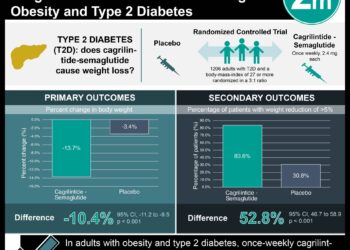Artificially sweetened beverage consumption may increase risk of type 2 diabetes
1. This meta-analysis revealed a positive association between habitual consumption of sugar sweetened beverages and the incidence of type 2 diabetes mellitus (DMII), independent of adiposity.
2. Consumption of artificially sweetened beverages was positively correlated with the incidence of DMII as well, but biases and confounders complicate the analysis.
3. The association between fruit juice consumption and DMII was unclear.
Evidence Rating Level: 1 (Excellent)
Study Rundown: The potentially deleterious health effects of consumption of sugar sweetened beverages have received significant media attention recently. Some have claimed that artificially sweetened beverages and fruit juices may offer healthier alternatives. However, the association between consumption of each type of beverage and the development of type 2 diabetes mellitus (DMII) has not yet been fully characterized. This meta-analysis extracted data from 17 prospective studies representing more than 38,000 unique cases in order to definitively analyze the association between beverage choice and DMII, while reducing confounders and biases.
The findings showed that an increase of 1 serving (250 g) per day of sugar sweetened beverages was associated with a 13% greater incidence of DMII when adjusted for adiposity. Additionally controlling for adiposity, artificially sweetened beverages and fruit juices were associated with an 8% and 7% greater incidence of DMII respectively. Upon sensitivity analysis, the quality of the association between sugar sweetened beverages and DMII remained strong, while the results for the other types of beverages were more equivocal. The study also calculated a population attributable fraction of DMII from the consumption of sugar sweetened beverages to be 8.7% in the US and 3.6% in the UK, resulting in an excess 1.8 million and 79,000 DMII cases in each country over 10 years respectively.
Though this study was limited by potential residual confounding and incomplete cohort identification, it offers an objective and detailed epidemiological analysis of the connection between sugar sweetened beverages and the development of DMII. Additionally, while causality has not been established, this study suggests that reducing one’s consumption of sugar sweetened beverages is protective against the development of DMII, and switching to artificially sweetened beverages and fruit juices may not be justified.
Click to read the study in the BMJ
Relevant Reading: Role of fructose-containing sugars in the epidemics of obesity and metabolic syndrome
In-Depth [systematic review and meta-analysis]: This systematic review and meta-analysis utilized data from 17 cohorts for a total of 38,253 cases, representing 10,126,756 person-years of follow-up, to analyze the association between the consumption of sugar sweetened beverages (SSB), artificially sweetened beverages (ASB), and fruit juices (FJ) and the development of DMII. Controlling for adiposity, a known confounder between beverage consumption and DMII, the study found an increased 13% risk (CI95% 5.8 – 21%) of DMII with an additional single daily serving of SSB. ASB and FJ consumption was also associated with an 8% (CI95% 2.1 – 15%) and 7% (CI95% 0.8 – 14%) increased risk respectively. SSBs were consumed by 54.4% and 49.4% of people in the US and UK respectively, with concomitant average daily dosages of 284 g and 114 g. Based on this exposure, population attributable fractions of DMII cases were 8.7% in the US (CI95% 3.9 – 12.9%) and 3.6% in the UK (CI95% 1.7 – 5.6%).
Image: PD
©2015 2 Minute Medicine, Inc. All rights reserved. No works may be reproduced without expressed written consent from 2 Minute Medicine, Inc. Inquire about licensing here. No article should be construed as medical advice and is not intended as such by the authors or by 2 Minute Medicine, Inc.







